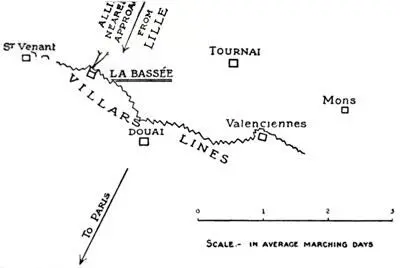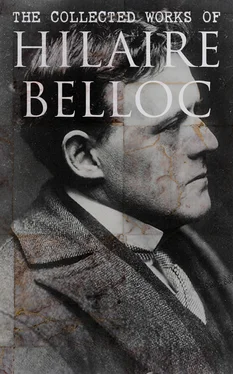
Sketch Map showing how the Lines of La Bassée blocked the advance of the Allies on Paris,
and Marlborough’s plan for turning them by the successive capture of Tournai and Mons.
The plan was strategically wise. The lines of La Bassée proper could not be pierced, but this right extremity of the French positions was backed by easy country; the swamps, canals, and entrenchments of the main line to the north and west were absent. With the defeat of the inferior French forces at this point all obstacle to an advance into the heart of France would be removed.
The plan was as rapidly executed as it was skilfully devised. Actually before the capitulation of the citadel of Tournai, but when it was perceived that that capitulation could only be a matter of hours, Lord Orkney had begun to advance upon the neighbourhood of Mons. Upon the day of the capitulation of Tournai, the Prince of Hesse-Cassel had started for Mons, Cadogan following him with the cavalry. Less than twenty-four hours after Tournai had yielded, the whole allied army was on the march throughout the night. Never was a military operation performed with organisation more exact, or with obedience more prompt. Three days later Mons was contained, and by Monday the 9th of September Villars awaited, some few miles to the west of that fortress, the assault of the allies.
There followed two days of delay, which will be discussed in detail later. For the purposes of this introductory survey of the political meaning of the battle, it is enough to fix the date, Wednesday, 11th September 1709. A little before eight o’clock on the morning of that day the first cannon-shot of the battle of Malplaquet was fired. To the numerical superiority of the allies the French could oppose entrenchment and that character in the locality of the fight, or “terrain,” which will be fully described on a later page. To the superior moral , equipment, and subsistence of the allies, however, it was doubtful whether any factor could be discovered on the French side.
An unexpected enthusiasm lent something to the French resistance; the delay of two days lent something more to their defensive power. As will be seen in the sequel, certain errors (notably upon the left of Marlborough’s line) also contributed to the result, and the whole day was passed in a series of attacks and counter-attacks which left the French forces intact, and permitted them in the early afternoon to rely upon the exhaustion of the enemy and to leave, in order and without loss, the field to the enemy.
Marlborough’s victory at Malplaquet was both honourable and great. The French were compelled to withdraw; the allies occupied upon the evening of the battle the ground upon which the struggle had taken place. It is with justice that Malplaquet is counted as the fourth of those great successful actions which distinguish the name of Marlborough, and it is reckoned with justice the conclusion of the series whose three other terms are Blenheim, Ramillies, and Oudenarde. So much might suffice did war consist in scoring points as one does in a game. But when we consider war as alone it should be considered for the serious purposes of history—that is, in its political aspect; and when we ask what Malplaquet was in the political sequence of European events, the withdrawal of the French from the field in the early afternoon of September 11, 1709, has no significance comparable to the fact that the allies could not pursue.
Strategically the victory meant that an army which it was intended to destroy had maintained itself intact; morally, the battle left the defeated more elated than the victors; and for this reason, that the result was so much more in their favour than the expectation had been. In what is most important of all, the general fortunes of the campaign, the victory of the allies at Malplaquet was as sure a signal that the advance on Paris could not be made, and as sure a prevention of that advance as though Marlborough and Eugene had registered, not a success, but a defeat.
Situations of this sort, which render victories barren or actually negative, paradoxical to the general reader, simple enough in their military aspect, abound in the history of war. It is perhaps more important to explain them if one is to make military history intelligible than to describe the preliminaries and movements of the great decisive action.
The “block” of Malplaquet (to use the metaphor which is common in French history), the unexpected power of resistance which this last of the French armies displayed, and the moral effect of that resistance upon the allies, have an historical meaning almost as high as that of Blenheim upon the other side. It has been well said that one may win every battle and yet lose a campaign; there is a sense in which it may be said that one may win a campaign and suffer political loss as the result.
Malplaquet was the turning-point after which it was evident that the decline of the French position in Europe would go no further. As Blenheim had marked the turn of the tide against Louis, so Malplaquet marked the slack water when the tide was ready to turn in his favour. After Blenheim it was certain that the ambition of Louis XIV. was checked, and probable that it would wholly fail. After Malplaquet it was equally certain that the total destruction of Louis’ power was impossible, that the project of a march on Paris might be abandoned, and that the last phases of the great war would diminish the chances of the allies.
The Dutch (whose troops in particular had been annihilated upon the left of the field) did indeed maintain their uncompromising attitude, but no longer with the old certitude of success; Austria also and her allies did continue the war, but a war doomed to puerility, to a sort of stale-mate bound to end in compromise. But it was in England that the effect of the battle was most remarkable.
In England, where opinion had but tardily accepted the necessity for war nine years before, and where the fruits of that war were now regarded as quite sufficient for the satisfaction of English demands, this negative action, followed by no greater fruit than the capitulation of the little garrison at Mons, began the agitation for peace. Look closely at that agitation through its details, and personal motives will confuse you; the motives of the queen, of Harley, of Marlborough’s enemies. Look at it in the general light of the national history and you will perceive that the winter following Malplaquet, a winter of disillusionment and discontent, bred in England an opinion that made peace certain at last. The accusation against Marlborough that he fought the battle with an eye to his failing political position is probably unjust. The accusation that he fought it from a lust of bloodshed is certainly a stupid calumny. But the unpopularity of so great a man succeeding upon so considerable a technical success sufficiently proves at what a price the barrenness of that success was estimated in England. It was the English Government that first opened secret negotiations with Louis for peace in the following year; and when the great instrument which closed the war was signed at Utrecht in 1713, it was after the English troops had been withdrawn from their allies, after Eugene, acting single-handed, had suffered serious check, and in general the Peace of Utrecht was concluded under conditions far more favourable to Louis than would have been any peace signed at the Hague in 1709. The Spanish Netherlands were ceded to Austria, but France kept intact what is still her Belgian frontier. She preserved what she has since lost on the frontier of the Rhine, and (most remarkable of all!) the grandson of Louis was permitted to remain upon the Spanish throne.
Читать дальше













